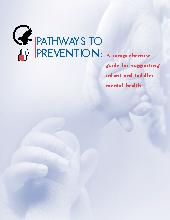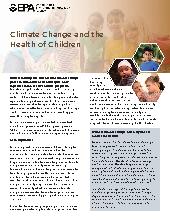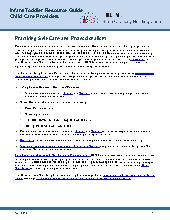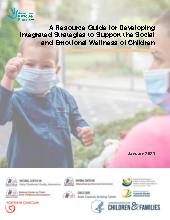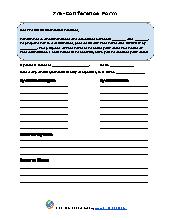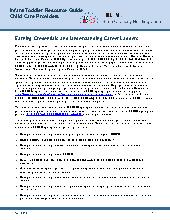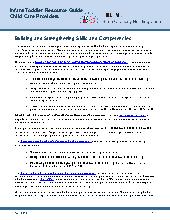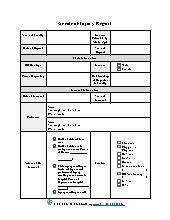45 Hour School Age Methods and Materials

Level
This course is designed to equip students with the essential skills required for working effectively in school-age child care programs. It covers a range of topics, including curriculum planning, selecting age-appropriate materials, and employing effective methods when working with children between the ages of six and thirteen. By the end of the program, students will be well-prepared to create engaging and developmentally appropriate learning experiences for school-age children, fostering their growth and academic development. Whether you are aspiring to become an after-school program coordinator or a dedicated educator for school-age children, this course provides the foundation for success in this vital role.
Format: 26 hours of Instructor-Led and 19 hours of online coursework.
Requirements and Expectations of Students:
100% Completion of Online Sessions: All online sessions should be completed according to the syllabus. students must have completed the online sessions by the last day of class in order to receive credit toward their final grade.
100% Participation: Each participant is expected to contribute to class discussions in an active and professional manner, supporting the participation of other class members. Your contributions are to be based on an informed and professional position.
100% Attendance: State requirements, specify that students must complete 45 hours of training. This is an interactive class, attendance is not only important but vital. An excused absence must be approved by the instructor. Certain family emergencies may qualify for an excused absence. Missed classes may affect your final grade and will prohibit you from receiving your certificate.
There is a minimum enrollment of 5 students in order for this course to proceed. All classes are non-refundable.
*Maryland Providers*
This Methods and Materials Training (this is the instructor-led version of the online Curriculum training) satisfies half of the MSDE requirement of 90 hours for child care teachers and directors. This course and a 45-hour growth and development course are required to complete the 90-hour certification for child care. If you have been issued a voucher from MSDE for this course it MUST be completed 2 weeks before the expiration date that is on your voucher. Please check your voucher for this date. Training Approval number PSO-30299 Aligns with MD Staff Credential levels 2-4. Earns 4.5 CEUs/45 clock hours.
*Don't see an upcoming session date available? No worries! Contact our office and we can work with you to schedule an upcoming session. Minimum number of participants required.*
By the end of this training, the learner will be able to:
- Demonstrate understanding of inclusionary practices for school-age children.
- Identify strategies that promote health and wellness for school-aged children.
- Demonstrate understanding of developmentally appropriate practices for school-age children with various needs.
- Identify safety management and supervision practices of school-aged children.
- Identify types of bullying affecting school aged children.
- List methods to help you plan a conference.
- Identify activities that promote emergent learning and development.
- Demonstrate an understanding of the cognitive and language stages of development in children five to twelve years of age
- Define childhood obesity.
- Identify strategies for preventing childhood obesity.
- Explain the new USDA MyPlate guide.
- Recognize the differences between major theories.
- Explain how theory is reflective in the child care environment.
- Identify theory and theorist in relation to child development.
- Define and identify common signs and behaviors of children and youth with ADHD.
- Demonstrate understanding of inclusionary practices for ADHD in the child care setting.
- Identify similarities between major theories.
- Demonstrate understanding of inclusionary practices for autism spectrum disorder in the child care setting.
- Define and identify common signs and behaviors of children and youth with conduct disorder.
- Demonstrate understanding of inclusionary practices for conduct disorder in the child care setting.
- Identify appropriate practice for the identification, prevention, and treatment of communicable diseases in childcare.
- Describe vehicle safety standards for school-age children
- Explain the historical context of emergent curriculum from its origins in the Reggio Emilia approach.
- Define the Cycle of Inquiry and how it can be used to plan emergent curriculum.
- Define and identify common signs and behaviors of children and youth with Autism Spectrum Disorder.
- Demonstrate an understanding of emergent curriculum.
- Identify health and safety curricular resources for the school-age setting
- Identify the importance of child nutrition and nutrition training for staff in childcare.
- Identify the nutritional needs of children aged four and above.
- Recognize theory and theorist in relation to child development and approaches to learning.
- Identify the recommended feeding patterns of school-age children.
- Identify causes of obesity in children.
- Explain the impact of stress on health and environment.
- Recognize strategies for effective conferences with families.
No prerequisites are required for the completion of this course.
Hours breakdown
22.5 CD/15 CUR/3 HSN/1.5 SN/2 PRO/1 COMTopics / Categories
Group AdminSchool-Age Providers
Not Applicable
Basic
Health, safety and nutrition
Curriculum and Environment
Professionalism
Child development
Observation and Assessment
Special Needs
- New Training Requirements from Office of Child Care/MSDE
- 45 Hour Pre-School and Child Growth and Development Training to be a Preschool Teacher in a Daycare
- How to Become a Pre-School Teacher in a Child Care Center in Maryland
- Why Take a 45 Hour Child Care Training?
- MSDE Approved 45 Hour School AGE Methods and Materials
- UNITED STATES OF AMERICA - Maryland
- UNITED STATES OF AMERICA - West Virginia
- Who needs to take the 45 Hour Infant and Toddler Curriculum Training
- Promote Yourself!
- Looking for a Career Change?
- 45 Hour Training: Lead Caregiver Requirements in Michigan
- How to Start a Daycare with Success
- MSDE Training Voucher Program: Benefits for Directors
- Maryland Child Care Training Voucher Program: Empowering Child Care Professionals
- The Foundation of Future Success: Why Early Childhood Education Matters
- How ChildCareED is leading the evolution of child care education in Maryland?
- Where Can I Study ECD online? The Best Online Resources for Aspiring Educators
- Studying ECD online: Why ChildCareEd Should be Your Top Choice
- 45 Hour Infant and Toddler Certification Online Georgia
